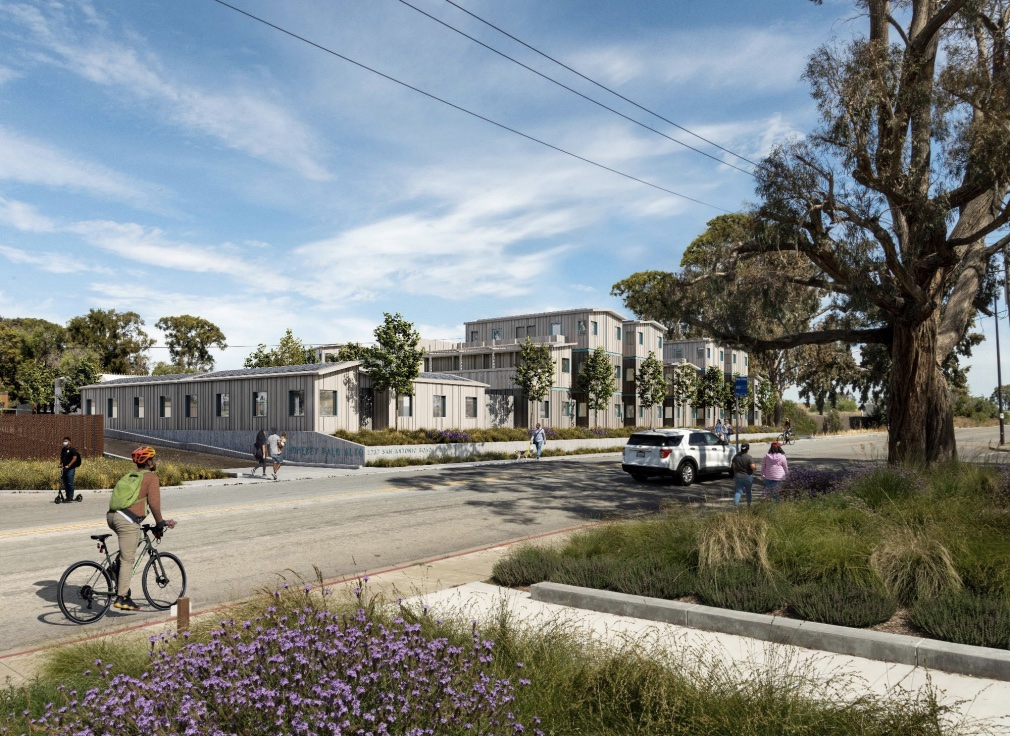When Palo Alto’s new homeless shelter on San Antonio Road opens in late 2024, it will offer its residents valuable amenities such as rooms, social services and pristine Baylands setting.
It will also offer them a somewhat less desirable amenity: an industrial yard next door operated by the city’s trash hauler, GreenWaste.
Palo Alto’s existing agreement with GreenWaste, which runs until 2026, allows the hauler to use the site just north of San Antonio for its operations. According to Administrative Services Department staff, the hauler uses the site for charging electric vehicles, storing containers and as a transitional yard for deconstruction.
Its operation will be disrupted, however, when the nonprofit LifeMoves, the operator of the homeless shelter, begins constructing its housing complex at 1237 San Antonio Road. The 88-dwelling development will consist of three-story buildings with 64 apartments for single residents and 24 for families.
Because the residences will occupy the site where GreenWaste currently stores its vehicles and equipment, the hauler will have to move. But under the agreement that the city and GreenWaste are preparing to strike, it won’t go very far. Rather, the GreenWaste operation will be immediately adjacent to the transitional-housing complex. To get to the hauler’s site, trucks will use a designated driveway that will run along the northern edge of the LifeMoves site.
The City Council is scheduled to approve the moving arrangement with GreenWaste on Sept. 5, when it amends its lease with GreenWaste for access to the site at 1237 San Antonio Road. Under the agreement, GreenWaste would relocate twice: once when the LifeMoves project is under construction and then again once it's complete.
The Administrative Services Department report notes that the LifeMoves project is projected to be completed around December 2024. Under the new agreement, the city will notify GreenWaste when the company is able to relocate again to its new premise adjacent to the residential complex, according to the report. GreenWaste will install new EV chargers before fully relocating, the report states.
The LifeMoves project is estimated to cost about $37.3 million, with $21.7 million coming from the state HomeKey program, which funded similar projects in Mountain View and Redwood City. The balance is being footed by the city, the county, LifeMoves and The Sobrato Organization, which donated $5 million for construction.
The GreenWaste facility isn’t the only industrial neighbor with which the residents of the LifeMoves project will have to share space. Palo Alto has an agreement in place with Santa Clara Valley Water District (Valley Water) that allows the district to construct a water purification plant at the site. The proximity of the plant, which will convert wastewater into potable water, raised some eyebrows at the council level in June, with council member Julie Lythcott-Haims observing that the city would never consider placing such a plant near a single-family neighborhood or apartment complex.
"It just makes me wonder how high on a totem pole a set of humans have to be so as not to have a facility built next to their Palo Alto home," Lythcott-Haims said at the June 6 meeting, referring to the wastewater plant.
Despite these concerns, the council voted 6-1 in July to approve a $1 per year lease with LifeMoves for the project site and to spend $7 million in city funds on the facility’s operations.
If the council approves the new license agreement with GreenWaste, as it is expected to do, it will allow the hauler to use the land next to the LifeMoves project until June 30, 2026, which is also when its existing contract for waste management expires.




Comments
Registered user
Another Palo Alto neighborhood
on Aug 29, 2023 at 9:55 am
Registered user
on Aug 29, 2023 at 9:55 am
Does this mean that the homeless will have access to the items cleared away by Greenwaste on our clean up days? Perhaps they can earn some money by helping to sort what is reusable and get first pickings on what may be salvagable.
Registered user
College Terrace
on Aug 29, 2023 at 11:23 pm
Registered user
on Aug 29, 2023 at 11:23 pm
@Bystander. I hope you are being ironic? Or are we back to the Great Depression Era and city hobo camps forced on top of city dumps?
The whole plan for homes for the desperately poor on sea level rise Bayland, a wastewater plant and a city dump ... All for a $1 a year lease. Note the plan is a big stink all the way around.
Registered user
Midtown
on Aug 30, 2023 at 8:46 am
Registered user
on Aug 30, 2023 at 8:46 am
@NTB2...the hobos of yesteryear and today's homeless population are two entirely different entities.
Being a hobo was a self-chosen lifestyle while being homeless is often due to other outside factors.
@Bystander...the only problem with the homeless scavenging at a wastesite is if they misappropriate aluminum and glass recyclables that the garbage company collects to recycle en masse.
Other than that, no problema. In parts of India, hundreds of impoverished people sift through mounds of garbage daily hoping to find something useful. It's kind of like the lottery.